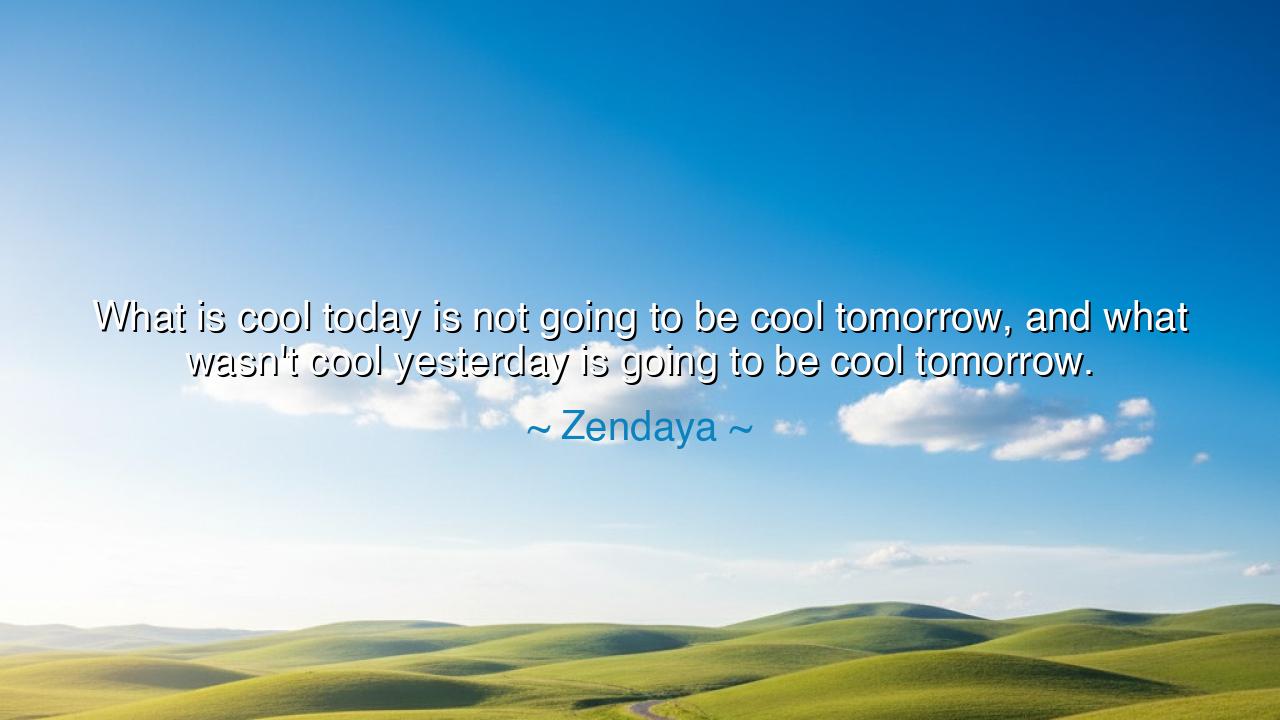
What is cool today is not going to be cool tomorrow, and what
What is cool today is not going to be cool tomorrow, and what wasn't cool yesterday is going to be cool tomorrow.






In the vast tapestry of time, there exists a profound truth that has guided the rise and fall of nations, the evolution of culture, and the ever-changing winds of human desire. Zendaya, in her words, "What is cool today is not going to be cool tomorrow, and what wasn't cool yesterday is going to be cool tomorrow," speaks to the ephemeral nature of trends and fashion. What is cherished and admired today may fade into obscurity tomorrow, and what is dismissed as irrelevant may rise to the height of esteem in the coming days. The cycles of admiration and disdain are like the turning of the seasons—ever-changing, yet inevitable.
In ancient times, the great philosophers understood this ebb and flow of public opinion. Heraclitus, the ancient Greek sage, spoke of the universal law of change when he said, "You cannot step into the same river twice." Similarly, Zendaya's words remind us that the very nature of coolness is transient and in constant flux. The things we hold dear today may become irrelevant tomorrow, just as the heroes and gods of one age fade into myth and are replaced by the ideals of the next. The cycles of history show us that what was once valued can, over time, become forgotten or even despised, only to be rediscovered and celebrated by future generations.
Consider the great Roman Empire, whose architectural marvels, once the pinnacle of human achievement, fell into decay and ruin as the empire crumbled. Yet, centuries later, these ruins were reawakened during the Renaissance, when artists and scholars rediscovered the grandeur of ancient Rome. What was once forgotten became the foundation of a new era's aesthetic and intellectual pursuit. Just as the Romans once admired the Greeks before them, what is seen as cool in one era may be cast aside, only to be revived and revered in another.
In the same way, the concept of coolness in human culture is not bound to any particular age or period. Take, for instance, the rebirth of ancient Eastern philosophies during the 20th century, a time when practices such as yoga, once largely unknown in the West, became popular and sought after. These ancient practices, dismissed by earlier generations, became central to the wellness culture of today. Zendaya’s wisdom mirrors the very nature of these cycles. What is revered today may seem distant and irrelevant tomorrow, yet it always holds the potential for revival in the future.
This truth holds power not only in culture but also in the lives of individuals. Youth often find themselves in pursuit of the latest fads, ever-changing and ephemeral, as they seek to find their place in the world. Yet, the ancient wisdom teaches us that the true measure of coolness lies not in following fleeting trends but in staying authentic to one’s self, for true worth never fades. What is cool is not the fashion of the day but the courage to embrace one’s unique essence. Authenticity, integrity, and the courage to be oneself stand the test of time, while trends, by their nature, are fleeting.
The lesson here is clear: embrace the moment, but do not cling to it. Zendaya’s words serve as a reminder that the winds of change are inevitable and that what we hold as “cool” today may soon be replaced by something new. However, this is not a reason to despair, but a call to freedom. In the great wheel of time, all things pass, and new things arise. It is in this dance of change that we find the rhythm of life itself. As each day unfolds, let us embrace what is meaningful, and know that tomorrow will bring a new opportunity for greatness, even in the things we once overlooked.
So, let us walk forward with this wisdom in our hearts: Do not be afraid of the passing trends or the shifting tides of culture. Instead, seek what is truly valuable—the timeless virtues of authenticity, compassion, and wisdom. For while what is cool today may not be cool tomorrow, the power to shape the future lies in how we engage with the present, in how we embrace change with grace, and in how we build legacies that will echo through the ages. Just as the ancients taught, the true beauty of life lies not in permanence, but in transformation.






AAdministratorAdministrator
Welcome, honored guests. Please leave a comment, we will respond soon